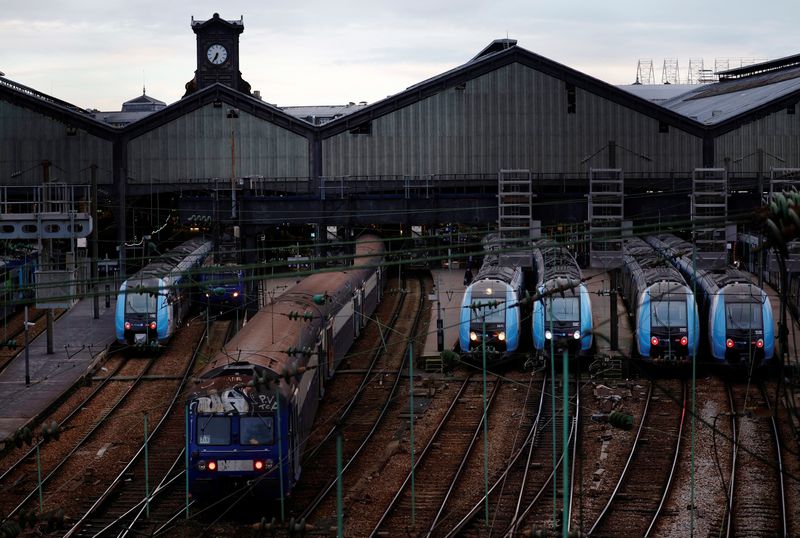
© Reuters. SNCF Express Regional (TER) trains are seen at the Saint-Lazare train station in Paris on the eve of a nationwide day of strike and protests in key sectors like energy, public transport, air travel and schools against the pension reform, France, January 1
2/5
By Noemie Olive and Juliette Jabkhiro
PARIS (Reuters) -French workers went on strike and joined marches across the country on Thursday, halting trains and cutting electricity production in protest against government plans to raise the retirement age by two years to 64.
The stoppages are a major test for President Emmanuel Macron, who says his pension reform plan, which opinion polls show is hugely unpopular, is vital to ensure the system does not go bust.
“It’s salaries and pensions that must be increased, not the retirement age,” read one large banner carried by workers that opened the protest march in Tours, in western France.
“I’ll have to prepare my walking frame if the reform goes through,” said Isabelle, 53, a social worker, saying her job was too tough to add two more years.
In Nice, in southern France, a large banner read: “No to the reform.”
Pushing back the retirement age by two years and extending the pay-in period would bring an additional 17.7 billion euros ($19.1 billion) in annual pension contributions, allowing the system to break even by 2027, according to Labour Ministry estimates.
“This reform is necessary and fair,” Labour Minister Olivier Dussopt told LCI TV.
Unions argue there are other ways to ensure the viability of the pension system such as taxing the super-rich or increasing employers’ contributions or those of well-off pensioners.
“This problem can be solved in a different way, through taxation. Workers should not have to pay for the public sector deficit,” said Laurent Berger, the leader of CFDT, France’s biggest labour union.
At the same Paris protest rally, Michel Liger, a 65-year-old retired firefighter, said he was there because he worried about his two daughters.
“My children shouldn’t have to work longer than me,” he said, adding that the government should instead tackle what he called “real problems” including the healthcare sector.
The challenge for the unions is to transform opposition to the reform – and anger over a cost-of-living crisis – into a mass social protest which could eventually force the government to change tack.
Union leaders, expected to announce more strikes and protests in the evening, said Thursday was just the beginning.
MUSICAL INTERLUDE
The pension reform still needs to go through parliament, where Macron has lost his absolute majority but is hoping to get it passed with the support of conservatives.
Train drivers, teachers and refinery workers were among those who walked off their jobs, as well as nearly 45% of staff at utility giant EDF (EPA:), the company said. France Inter radio played music instead of its usual programming and bus drivers and civil servants also went on strike.
Only between one-in-three and one-in-five high-speed TGV lines were operating, with barely any local or regional trains running, the SNCF rail operator said.
In Paris, some metro stations were closed and traffic was seriously disrupted, with few trains running.
In the busy Gare du Nord station, people rushed to catch the few trains still operating while employees in yellow vests were assisting frazzled commuters.
Restaurant worker Beverly Gahinet, who missed work because her train was cancelled, said she agreed with the strike even if she was not taking part.
But not all were so understanding.
“I don’t understand, it’s always the same (people) who are on strike … and we have to endure it,” said real estate worker Virginie Pinto, as she struggled to find a metro to go to work.
A 2007 ban on wildcat walkouts and restrictions on strikes to guarantee minimum public services have limited unions’ ability to wear down governments’ reform ambitions.
The fact that working from home is much more common now since the pandemic could also have an impact.
Some seven out of 10 primary school teachers stopped work, and nearly as many in high schools, their unions said, though the Education Ministry gave much lower figures.
In Paris, students blockaded at least one high school in support of the strike action.
EDF and grid operator RTE data showed electricity production was down by roughly 12% of total power supply, prompting France to raise imports.
Shipments were blocked at TotalEnergies’ refineries in France, union and company officials said, but the company said one strike day would not disrupt refinery operations.
The impact on air traffic was largely limited to a reduction of about 20% of flights in Orly, Paris’ second-biggest airport. Air France said it was operating all its long-haul flights and 90% of other flights.
Macron and several of his ministers meanwhile were in Barcelona on Thursday for a meeting with Spanish officials.